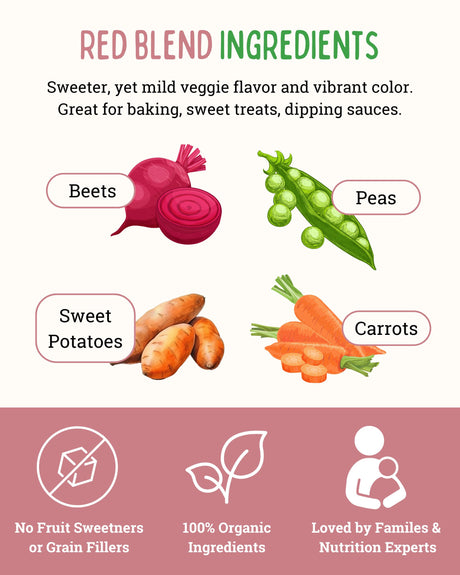Embracing New Beginnings: The Power of Nutritional New Year Resolutions
As we usher in a new year, it's a time of reflection and anticipation. For many of us, this means setting resolutions to improve our lives and the lives of our loved ones. Among the most impactful resolutions we can make are those related to nutrition. The start of a new year offers a unique opportunity to reset our dietary habits and make conscious choices towards healthier living.
Realistic Nutrition Goals for the Whole Family
When it comes to setting nutritional goals, the key is realism and inclusivity. It's not just about individual aspirations but about bringing the whole family on board with healthier eating habits.
This approach ensures that everyone, from the youngest to the oldest, benefits from a balanced and nourishing diet. By setting achievable and family-friendly nutritional goals, we pave the way for sustainable health improvements that can last the entire year and beyond.
Reflecting on the Past Year
Taking Stock: Reflecting on Last Year's Eating Habits
As we step into a new year, it's beneficial to look back and reflect on our eating habits from the past year. This reflection is not about dwelling on shortcomings but rather understanding and learning from our experiences. For parents, this means considering not just their own dietary choices but also those of their family as a whole.
Common Nutritional Hurdles for Families
Every family faces its unique set of challenges when it comes to nutrition. Perhaps it was a struggle to find time for home-cooked meals, or maybe picky eating habits limited the variety of foods consumed at home.
For some, the challenge might have been balancing convenience with health, leading to a reliance on processed foods. Recognizing these challenges is the first step towards overcoming them in the year ahead.
Understanding Nutritional Needs
Nutritional Essentials for the Whole Family
Navigating the nutritional needs of a family can be complex, as each member, from the youngest to the oldest, has unique dietary requirements. It's crucial to understand these differences to ensure everyone gets the nutrients they need for optimal health.
Tailoring Nutrition Across Ages
For children, a diet rich in calcium and vitamin D is essential for strong bone development, while teenagers, undergoing rapid growth and hormonal changes, require increased iron, especially in girls, and protein. Adults, on the other hand, might focus more on heart-healthy foods and maintaining a balanced intake of carbohydrates, proteins, and fats.
The Cornerstone of Health: A Balanced Diet
At the heart of good nutrition lies the concept of a balanced diet. This includes a variety of fruits and vegetables, whole grains, lean proteins, and healthy fats. It's not just about what we eat, but also how these different food groups work together to support overall health and well-being.

Setting Realistic Goals
Crafting Achievable Nutritional Objectives
Embarking on a journey towards better nutrition begins with setting goals that are both realistic and attainable. It's about creating objectives that are specific, measurable, and tailored to your family's lifestyle and needs.
Embracing Incremental Changes
The key to lasting success in any nutritional plan is to focus on small, manageable changes. Rather than overhauling your entire diet overnight, consider introducing healthier options gradually. This could mean adding an extra serving of vegetables to dinner each night or swapping out sugary snacks for fruit a few times a week.
Measurable Milestones
Set goals that you can track and measure. For instance, if increasing water intake is a goal, aim for a specific number of glasses per day. If you're looking to reduce processed foods, start by eliminating them from one meal a day. These measurable steps make it easier to track progress and stay motivated.
Celebrating Small Victories
Remember, every step towards a healthier diet is a victory. Celebrate these small wins with your family, whether it's trying a new vegetable or successfully cooking a healthy meal together. These celebrations reinforce positive changes and encourage continued progress.
Family-Friendly Nutritional Goals
More Veggies on the Plate
Aim to include a wider variety of vegetables in your family's meals. This could mean adding a side salad to dinner or incorporating veggies into breakfast omelets. The benefits? A boost in essential vitamins, minerals, and dietary fiber.
Cutting Down on Sugar
Reducing sugar intake is a common and impactful goal. Start by swapping sugary snacks with fruits or yogurt. This change can lead to better energy levels and reduced risk of dental issues and obesity.
Weekly Healthy Recipe Adventures
Commit to trying one new healthy recipe each week. This not only introduces variety into your meals but also encourages kids to explore different flavors and ingredients, fostering a love for wholesome foods.
Hydration Goals
Set a family goal for daily water intake. Staying well-hydrated is crucial for overall health, aiding in digestion, energy levels, and even skin health. Make it fun by tracking everyone's water intake with a chart or app.

Mindful Eating Practices
Encourage mindful eating habits, like eating without distractions and listening to hunger cues. This goal can lead to better digestion, improved eating habits, and a deeper appreciation for food.
These goal ideas offer a range of benefits, from improved nutritional intake to fostering healthier eating habits. Each goal is designed to be family-friendly, encouraging participation from all family members and promoting a healthier lifestyle together.
Family Involvement in Healthy Eating
Making Healthy Eating a Family Affair
Involve everyone in the family in the journey towards healthier eating. This can be as simple as having kids help pick out fruits and vegetables at the grocery store or involving them in meal preparation. The key is to make healthy eating a shared responsibility and adventure.
Fun with Food: Engaging Kids in the Kitchen
Encourage children to participate in cooking. Simple tasks like washing vegetables, stirring ingredients, or setting the table can make them feel involved and more interested in the meal. This engagement often leads to kids being more willing to try new, healthy foods they helped prepare.
Family Meal Planning: A Collaborative Approach
Set aside time each week for family meal planning. Discuss everyone's favorite meals and how they can be made healthier. This not only teaches kids about nutrition but also ensures that meals cater to everyone's tastes, making healthy eating more enjoyable for the whole family.
Grocery Shopping: A Learning Experience
Turn grocery shopping into an educational experience. Teach kids how to read food labels and choose fresh, whole foods over processed items. This hands-on learning is invaluable in instilling healthy eating habits from a young age.
By involving the whole family in these activities, you're not only working towards healthier eating habits but also strengthening family bonds. These strategies make the journey towards better nutrition enjoyable and educational for everyone involved.
Monitoring Nutritional Goals
Embracing Tools for Tracking Progress
In the journey towards healthier eating, keeping track of progress is crucial. Utilize tools like food diaries, nutrition tracking apps, or even a simple family meal planning board. These tools can help monitor daily food intake, track changes, and keep everyone accountable.
The Role of Food Diaries in Goal Tracking
Encourage family members to maintain a food diary. This can be a fun and educational activity, especially for kids. It helps in understanding eating patterns, identifying areas for improvement, and staying committed to nutritional goals.
Leveraging Technology: Nutrition Apps
There are numerous apps available that make tracking nutrition both easy and engaging. These apps often come with features like calorie counters, recipe suggestions, and progress reports, making them a valuable asset in your nutritional journey.
Family Meal Planning Boards: A Visual Aid
Consider setting up a family meal planning board in a common area of the home. This can be a fun way to involve kids in meal planning and to visually track what the family is eating each week. It's also a great reminder of the week's nutritional goals.
Celebrating Achievements
It's important to recognize and celebrate small victories along the way. Whether it's trying a new vegetable, cooking a healthy meal together, or reaching a weekly goal, acknowledging these achievements can boost morale and encourage continued effort.
Tracking progress is not just about adhering to goals; it's about understanding and appreciating the journey towards a healthier lifestyle. By regularly monitoring and celebrating achievements, families can stay motivated and committed to their nutritional resolutions.
Navigating Nutritional Hurdles
Tackling Busy Schedules
In today's fast-paced world, one of the biggest challenges families face is managing nutrition amidst hectic schedules. To combat this, planning is key. Consider meal prepping on weekends or choosing quick, healthy recipes for weekdays. Utilize slow cookers or pressure cookers for efficient meal preparation. Remember, healthy eating doesn't have to be time-consuming.

Strategies for Picky Eaters
Dealing with picky eaters can be a significant hurdle. To encourage diverse eating habits, involve kids in meal planning and preparation. Introduce new foods alongside familiar favorites and consider creative presentations to make meals more appealing. Patience and persistence are essential, as it often takes multiple exposures for a child to accept a new food.
Budget-Friendly Nutrition
Eating healthily doesn't have to strain the budget. Shop for seasonal produce, which is often more affordable and at its nutritional peak. Bulk buying, choosing store brands, and utilizing local farmers' markets can also help save money. Planning meals around affordable protein sources like beans and lentils can also reduce costs without compromising nutrition.
Embracing Flexibility
Remember, it's okay to have days when things don't go as planned. Flexibility is crucial in maintaining a balanced approach to nutrition. If a meal or a day doesn't meet your nutritional goals, don't stress. Focus on the bigger picture and get back on track with the next meal.
Overcoming these challenges requires a combination of planning, creativity, and flexibility. By addressing these common obstacles with practical solutions, families can navigate their nutritional journey more smoothly, ensuring that healthy eating becomes a sustainable part of their lifestyle.
Keeping the Nutritional Spark Alive
Cultivating Consistent Motivation
Staying motivated in our nutritional journey is crucial, especially as the initial excitement of New Year's resolutions fades. To maintain this momentum, set clear, achievable goals and regularly remind yourself and your family of the reasons behind these choices. Whether it's improved health, more energy, or setting a good example for the kids, keeping these motivations at the forefront can help sustain your commitment.
Celebrating Milestones
Acknowledging and celebrating milestones, no matter how small, can significantly boost motivation. Did the family successfully incorporate a new vegetable into their diet? Or perhaps managed a week without processed snacks? Celebrate these victories! They are stepping stones to larger goals and deserve recognition.
Support Systems: Family and Beyond
Having a strong support system is invaluable. Encourage family members to support each other's efforts. Share your goals with friends or join online communities focused on healthy eating. These networks can offer encouragement, share tips, and provide a sense of accountability, which is often a powerful motivator.
Visual Reminders and Rewards
Visual reminders can be a daily source of motivation. Consider a chart on the refrigerator tracking the family's progress or motivational quotes in the kitchen. Additionally, set up a reward system that celebrates reaching goals. These rewards could be non-food related, like a family outing or a new cookbook.

Adapt and Overcome
Finally, be prepared to adapt your goals as needed. If a particular approach isn't working, don't be afraid to adjust your strategy. Flexibility can prevent frustration and help maintain motivation. Remember, the path to better nutrition is a marathon, not a sprint, and staying motivated is key to long-term success.
By implementing these strategies, families can maintain their motivation and continue to make positive nutritional changes throughout the year. With each small step, they move closer to a healthier lifestyle, creating a lasting impact on their overall well-being.
Nourishing the Self: The Intersection of Nutrition and Well-Being
Embracing Nutritional Self-Care
In the journey of nurturing our families, it's essential for parents to remember the profound connection between nutrition and personal well-being. Prioritizing your nutritional needs is not just about physical health; it's a form of self-care that impacts mental and emotional wellness. When parents are nutritionally fulfilled, they are better equipped to handle the demands of parenting and daily life.
The Ripple Effect of a Healthy Diet
A balanced diet rich in nutrients does more than just keep the body healthy; it also influences mood, energy levels, and overall mental clarity. Incorporating a variety of whole foods, rich in vitamins, minerals, and antioxidants, can lead to improved mood and reduced stress. This, in turn, creates a positive environment for the entire family.
Mindful Eating: A Path to Wellness
Mindful eating is a powerful tool for self-care. It involves being present during meals, savoring each bite, and listening to your body's hunger and fullness cues. This practice not only enhances the enjoyment of food but also encourages a healthier relationship with eating, leading to better food choices.
Hydration: The Foundation of Nutritional Wellness
Often overlooked, proper hydration is a cornerstone of good nutrition and self-care. Water plays a crucial role in every bodily function, and even mild dehydration can impact mood and energy levels. Parents should aim to drink adequate water throughout the day, setting a positive example for their children.
The Role of Supplements in Self-Care
While a balanced diet is key, supplements can play a supportive role in ensuring you're getting all the necessary nutrients. Consult with a healthcare provider to understand if supplements like multivitamins, omega-3 fatty acids, or probiotics could benefit your specific nutritional needs.
By integrating these aspects of nutritional wellness into their self-care routine, parents can enhance not only their health but also the overall well-being of their family. Remember, taking care of yourself is not a luxury; it's a necessity that empowers you to be the best parent you can be.
Wrapping Up: Embracing Nutritional Goals for a Healthy Year
Reflecting on Nutritional Aspirations
As we conclude, let's revisit the essence of setting nutritional goals for the new year. These goals, whether they involve incorporating more fruits and vegetables, reducing processed foods, or exploring new healthy recipes, are stepping stones towards a healthier lifestyle for you and your family. Remember, each small change contributes to a larger impact on your family's well-being.
A Year of Health and Optimism
Embarking on this journey requires more than just a list of goals; it calls for an optimistic mindset and a commitment to health. Approach the new year with a positive outlook, understanding that each day presents an opportunity to make choices that align with your family's health objectives. Embrace the process, knowing that every effort, no matter how small, is a stride towards a healthier future.
Sharing and Inspiring
Finally, we invite you to share your family's nutritional goals for the year. Leave your comments below; we love to hear from you! And don't forget to follow EasyPeasie for more veggie info and convo on YouTube, Facebook, and Instagram!
By exchanging ideas and experiences, we can inspire and support each other in this collective journey. Whether it's a creative recipe that your kids love, a successful strategy for dealing with picky eaters, or a personal milestone in your health journey, your stories can motivate others in our community.
Let's step into the new year with a shared vision of health, nourishment, and well-being. Together, we can make this year a remarkable one for our families' nutritional journeys.













